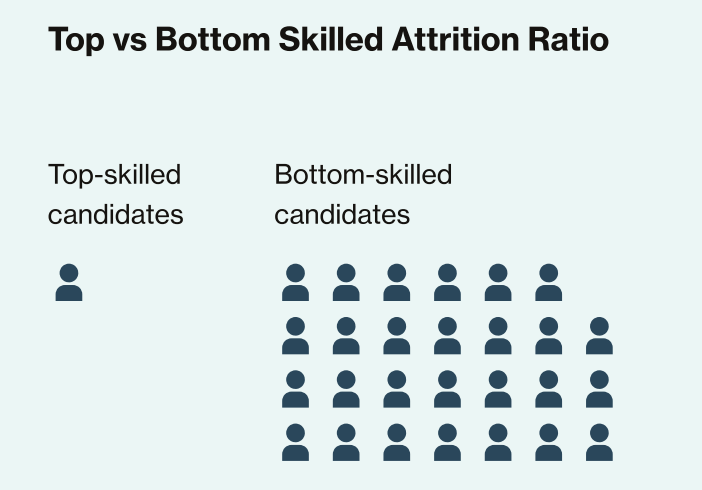
In 2025, soft skills have become the defining factor in call center success—outweighing technical proficiency and scripted responses. As customer expectations continue to rise and AI increasingly handles routine inquiries, the human touch is more vital than ever. Agents equipped with strong communication, empathy, and problem-solving skills are not only delivering standout customer experiences but also reducing attrition and driving business outcomes. Today’s agents are eager to grow, and companies that prioritize skills-based hiring, personalized development, and reskilling are seeing measurable gains in retention and satisfaction. This guide explores the most critical call center soft skills, how to develop them, and answers the most common questions contact center leaders are asking about building high-performing, future-ready teams.
Why Are the Right Call Center Soft Skills Crucial in 2025?
Soft skills are the foundation of great customer service. They allow agents to connect with callers and de-escalate situations, delivering better experiences.
Companies can no longer afford to drop the ball here. According to Five9 research, almost 50% of customers will leave a brand after one negative support experience in 2025. And 95% will share their frustration with others who may be potential buyers.
Here are four reasons why specific skills are now crucial in call center environments:
Customer Expectations Are Higher than Ever
Today’s customers expect quick, personalized support. So, it’s no wonder Gartner research suggests that “improving CX” is the top priority for customer service leaders.

Buyers don’t just want companies to resolve their issues. They expect experiences to be genuinely helpful—and most importantly, fast. Around 40% will switch companies if they don’t get solutions the first time they call.
Imagine a customer reaching out about a confusing charge. An agent who listens, acknowledges the issue, and reassures them patiently can turn a stressful moment into a memorable impression.
When service feels robotic or dismissive, people move on. But when reps meet them with empathy and clear communication? That creates customer loyalty.
Skilled Agents Reduce Attrition Rates
Hiring agents with the right customer service skills means you have the best-fit people from the start. They come in ready to handle difficult situations and support teammates.
When skilled call center agents prove they can do the role when applying, they feel more capable. And that confidence means they’re less likely to burn out or quit.
Think of an agent who’s great at delivering difficult messages. They’re less rattled by angry callers and stay focused on the outcome to provide faster solutions.
In fact, the above-mentioned HiringBranch report shows that for every top-skilled customer service employee hired, 27.3 bottom-skilled attrited.

When retention is higher and staffing is stable, callers benefit from more consistent service. Agents can resolve calls faster and keep customer satisfaction (CSAT) scores high.
While it’s ideal to hire the right agents from day one, new or current team members can also pick up critical skills on the job.
Further reading: Learn more about average attrition rates in high-volume roles and how to improve them.
Agents Are Keen to Learn
Training agents gives them the tools to handle challenges more effectively and provide better service. These opportunities also open the door to future roles in leadership, training, or other departments such as customer success.
Ever-evolving customer needs and contact center technology certainly contribute to the need for training.
According to WEF research, 60% of workers will require skills and software training in the next couple of years. Around 44% will experience skills disruption (the need to learn new skills when roles shift) before 2028.
However, many contact center agents also want to grow professionally. PwC research suggests that 77% of employees are ready to adapt to new ways of working. Plus, 72% are excited by opportunities to develop in their roles.

With coaching and practice, a new agent could become the go-to person for handling tough conversations. While this upskilling benefits the agent and their future career, it also positively impacts every customer they support.
Artificial Intelligence Is Handling Simple Inquiries
AI-powered tools can now resolve most routine questions, from checking order statuses to tracking shipments. According to Call Centre Helper, almost 70% of contact centers have an AI strategy or are working on one.
In many cases, agents only need to step in when the issue is complicated, sensitive, or emotionally charged.
Because every human interaction matters more in these situations, frontline customer service reps need the right soft skills to:
- De-escalate tension
- Solve layered problems
- Connect with people who may already feel frustrated by the time they reach them
Think of a customer who’s tried speaking to a generative AI chatbot. They’ve also searched the help center and still have no clear answer.
An agent who can calmly take control and explain the next steps may turn the experience around.
Further reading: Learn the latest 58 call center statistics to make better decisions and improve customer experiences.
5 Data-Backed Contact and Call Center Soft Skills for Outstanding CX
Soft skills turn scripts into real conversations and resolutions into lasting impressions. They help agents stay calm under pressure and communicate clearly. Plus, they make customers feel valued.
While a mix of traits makes a great agent, HiringBranch’s recent Skills-Based Hiring Performance Report: AI Edition revealed the essential customer service skills that top performers share:

Let’s explore these five most crucial agent soft skills (backed by data and including tips to develop them).
1. Speaking Fluently
Speaking fluently is a practical communication skill that helps agents build trust with callers faster. It reduces misunderstandings and allows customers to feel “heard” (even when the answer isn’t what they hoped for).
Interacting smoothly also enables agents and teams to work better together behind the scenes.
Clear, empathetic communication is at the heart of every great customer interaction. Speaking well in the company’s or customer’s native language is essential. But it’s also about ensuring the message lands in a way that feels human and is easy to understand.
Let’s say a customer isn’t sure where to find old features in an updated software interface. An agent with strong fluency and communication skills may say something like:
“You’re not the only one with questions about this update. I’ll walk you through the new dashboard and show you exactly where to find your account details.”
Why this works: The agent recognizes the customer’s confusion and uses clear, supportive language to guide them step by step—without making them feel lost or at fault.
Call and contact center leaders can encourage agents to hone their fluency and communication skills by:
- Creating a knowledge base so agents have the correct information for each call at their fingertips
- Offering training with open-ended chat simulations that let agents practice speaking clearly and fluently
- Using smart call monitoring technology to provide real-time feedback on phrasing
- Role-playing tough conversations to build confidence with uncertainty
An agent who communicates effectively ensures conversations are more straightforward for everyone involved.
2 & 3: Acknowledgement and Paraphrasing
Acknowledgement and paraphrasing are two crucial branches of active listening. These soft skills enable agents to fully understand and repeat a customer’s situation before offering solutions. They give frontline employees the information they need to solve problems faster and more accurately.
Listening intently makes it easier to pick up on emotion and respond in a similar tone. This “mirroring” is a psychological principle that builds rapport with callers and makes them feel more comfortable.
Making customers feel valued by showing you truly understand their problem can also de-escalate frustration.
For example, a customer may be upset because they were charged twice for an order. An agent using active listening might respond like this:
“Thanks for explaining. I completely understand how frustrating it is to be charged twice, especially when you’re waiting for a refund. Let me check your account and make this right.”
Why this works: The agent reflects the emotion while acknowledging the customer’s concern and paraphrasing it to show they’ve listened. Then, reassure them by taking action.
Here are four ways call center managers can train agents on their active listening skills:
- Encourage team members to repeat or summarize key points during the call to practice paraphrasing
- Suggest pausing before responding to avoid talking over customers
- After the call, offer feedback on tone, pacing, and moments where acknowledgement and empathy could have been better
- Highlight call recordings that include strong examples of active listening so others can learn
An agent who practices this type of listening and repetition makes customers feel understood and cared for, especially in challenging situations.
4. Positive Language
Positive language helps customers feel confident in making decisions or taking the next steps by clearly explaining their benefits in a friendly way. Combining this sales skill with persuasive techniques allows agents to influence callers without being pushy.
A positive and proactive contact center agent’s approach can include:
- Guiding someone toward the right product for their unique needs
- Encouraging customers to stay with the company
- Explaining why a policy exists to protect both parties
Let’s say a customer is unsure about upgrading their plan. A positive, persuasive agent might say:
“I totally understand your concern. But a lot of customers who also use multiple devices have loved the upgraded plan as they find it more flexible. Would you like me to walk through the differences to make sure it’s the right choice for you?”
Why this works: Sharing relatable context with positive language and offering to explain further (not sell, yet) reduces pressure and helps the customer feel like it’s their choice.
Call and contact center managers can condition agents to use this type of language in three ways:
- Offering training on value-based language and framing (e.g., talking about a product’s benefits instead of features)
- Arranging cross-training with sales departments (e.g., walking through upbeat ways to handle objections like salespeople face when trying to close deals)
- Making sure agents receive in-depth product knowledge so their suggestions always sound accurate and trustworthy
An agent who can persuade with positivity gives customers the confidence to make decisions they feel good about.
5. Delivering Difficult Messages
Delivering difficult messages is a crucial part of conflict resolution, which helps agents defuse tension and stay calm under pressure. It involves sharing news customers may not want to hear, while guiding conversations toward positive outcomes (even when emotions run high).
In customer service, frustration is inevitable. What matters is how the agent handles it. A calm, empathetic response can flip a negative experience into a moment of trust.
Let’s consider a customer who’s upset about a delayed shipment and blames the company. An agent skilled in delivering difficult messages might respond:
“I completely understand how frustrating this delay is. Especially if you were counting on it arriving earlier for your party. Unfortunately, I can’t get it there sooner. But let’s look at our options and how we can make this right.”
Why this works: The agent acknowledges the customer’s frustration (without becoming defensive) while delivering the bad news. Then, they focus the conversation on next steps and solutions.
Call center training allows agents to exercise conflict resolution skills through:
- Coaching to stay focused on solutions rather than blaming anyone
- Practicing de-escalation techniques (e.g., apologizing sincerely) via role-play with other agents
- Providing scripts or phrases that show empathy without overpromising
Agents who can handle challenging interactions and prevent tensions from boiling over often create better long-term customer relationships.
5 Bonus Soft Skills That Set Great Agents Further Apart
While these first five skills are essential, several bonus abilities take a rep’s performance to the next level. They’re often what separates a good customer experience from a great one.
Here are five extra soft skills that highly skilled agents share (with tips to hone them).
1. Problem-Solving
Problem-solving helps agents think clearly under pressure and make fast decisions. Because finding workable solutions is a common situation in customer service roles.
It’s vital when processes don’t go as planned or when customers face unique challenges that fall outside the script.
Say a caller receives a shipping notification for the wrong item. And the correct one is now out of stock.
An agent with strong problem-solving skills might respond:
“I’m so sorry, but it looks like we’re waiting for stock of that desk. I can either refund you or help you choose a similar one that I’ll make sure ships today. Let me know what works better for you.”
Why this works: The agent doesn’t get stuck on what they can’t do. Instead, they focus on solving the issue quickly with clear options that keep the customer in control.
Call and contact center teams can support agents in developing problem-solving skills by:
- Designing training that challenges team members to troubleshoot real-world customer issues, not just follow scripts
- Equipping agents with decision-making frameworks so they can assess a situation and choose the best resolution path
- Encouraging a mindset of “owning the issue” from start to finish
- Debriefing tricky calls to highlight creative solutions and learning moments
An agent who can solve problems calmly and creatively keeps conversations moving and customers coming back.
2. Time Management
Time management sees agents complete tasks efficiently without rushing the customer. Staying focused while managing multiple systems or conversations is a huge part of working in a call center.
When team members succeed, they reduce wait times and keep queues moving. Delivering complete, timely support like this keeps callers happier.
Agents who manage their time well also avoid burnout more naturally. According to Timewatch research, 91% of professionals believe better time management reduces stress at work.
A customer may have a long list of questions about their account. An agent that’s mindful of call hold times might say:
“Great questions. I’ll walk you through the most important details now, then send a follow-up email with the rest so you’ve got everything in one place.”
Why this works: Balancing thoroughness with efficiency ensures the customer feels satisfied while keeping the interaction on track.
Time management might seem like an innate skill. But contact centers can support agents to improve their skills with these four tips:
- Make sure agents know to prioritize key customer issues and tasks
- Give team members tools that reduce repetitive tasks or screen-switching (e.g., cloud-based call center software)
- Encourage using post-call notes or follow-ups to handle overflow questions
- Set realistic expectations for call handling time, first call resolution (FCR) rate, and other key time-based metrics
An agent with strong time management skills creates smooth, efficient experiences while managing their well-being better.
3. Emotional Intelligence
Emotional intelligence equips agents to recognize a customer’s mood and respond appropriately. These team members know when to lead with a positive attitude or let a caller vent. This awareness nurtures trust and keeps conversations productive.
It’s such a critical skill that Call Center Helper research indicates 64.5% of contact centers measure “advisor empathy” more than speedy responses on digital channels.
Let’s say a customer sounds anxious after receiving an unexpected charge. An emotionally intelligent agent would respond with empathy:
“I can hear your concern. Let’s look into this together and make sure your bill adds up the way it should.”
Why this works: The agent senses the emotion behind the question, then acknowledges it kindly and offers support.
Some customer service agents will have more natural emotional intelligence than others. Here are four tips for the rest of the team to work on it:
- Include empathy-building activities (e.g., defending unreasonable requests when role-playing) in agent training
- Encourage reflection after difficult conversations to pinpoint areas for improvement
- Highlight tone and language cues during quality assurance (QA) reviews
- Share examples of emotionally smart responses during team meetings
An emotionally intelligent agent can better understand customer needs to grow stronger connections—even before solving the issue!
4. Patience
Patience allows agents to stay calm and respectful, especially when faced with frustrated customers or confused callers who may be moving at a slower pace.
It’s a quiet skill but a powerful one. Patience allows agents to handle repetitive questions or long-winded explanations without showing irritation.
This calming trait can also have the same effect on irritated callers after a while.
For instance, a customer may have trouble following instructions to reset their password. A patient agent might say:
“No worries. We can take it one step at a time. Let me know what you see on your screen right now, and we’ll go from there.”
Why this works: The agent doesn’t rush or correct. They slow down, offer reassurance, and create space for the caller to engage without feeling stressed.
Patience is a skill all call center employees can work on. Leaders can support by:
- Setting realistic goals for call handle time so speed doesn’t come at the cost of care
- Encouraging mindfulness or breathing techniques before and after tough calls
- Sharing real examples of when patience led to excellent outcomes
- Supporting mental breaks and recovery time during high-stress shifts
An agent who practices patience makes customers feel respected and never like a burden. No matter how long the call takes.
5. Adaptability
Adaptability means being able to shift gears when things change. That might mean a new CRM tool, an updated policy, or a customer situation that takes an unexpected turn.
In fast-paced contact centers, no two days (or calls) are ever quite the same. Agents who stay calm and flexible can handle changes without negatively impacting the customer experience (CX).
For instance, a customer may want support through live chat, but the issue is a little more nuanced. An adaptable contact center agent might say:
“This looks like something we can fix faster over the phone. If you’re open to it, I can give you a quick call now and walk through it together.”
Why this works: The agent adjusts in real time to offer a solution that fits the situation while still giving the customer a choice.
Here are three ways call and contact centers can build more adaptable agents:
- Offer cross-training on different tools and channels so team members can hop back and forth
- Rotate agents through new workflow pilots every quarter, followed by short debriefs on what was challenging or unexpected
- Practice scenarios where customer requests or expectations switch, so flexibility becomes second nature
An adaptable agent can respond to change without missing a beat, so customers always feel cared for.
How to Improve Contact and Call Center Agent Skills
While we’ve covered tips for building each soft skill individually, there’s more that companies can do to support development at scale.
Here are four ways to create a work environment where all agents perform with confidence:
1. Use Skills-Based Hiring (Not Resumes)
While traditional resumes often fall short in call and contact center hiring, skills-based recruitment shifts the focus to what matters: real-world capabilities.
Resumes highlight job titles and timelines instead of qualities that actually predict success (like communication or adaptability). Meanwhile, skills-based hiring asks important questions like:
- Can someone handle a frustrated caller with grace?
- Can they explain a technical issue clearly?
These details are way more relevant than where they worked five years ago.
The same HiringBranch study suggests that skills-based hiring is so crucial that it reduces bad hire rates by 400% in large enterprises.

Smart hiring teams use soft skills assessments to evaluate candidates on job-relevant skills (with 98% accuracy). These traits are proven to lead to better customer experiences.
How to implement skills-based hiring:
- Replace resume screening with AI-powered skill assessments or simulations
- Pinpoint candidates who show strong communication or problem-solving traits
- Prioritize agent performance in role-based interactions over previous job titles or industries
2. Implement Personalized Upskilling Initiatives
One-size-fits-all training often misses the mark. Because every agent has different strengths and learning styles.
Upskilling initiatives should meet team members where they are. One might need to improve active listening, while another needs better technical knowledge.
Creating personalized development plans helps agents grow both soft and hard skills. For example, soft skills AI can pinpoint gaps using real-time performance data and track progress as agents improve.
The recruiter dashboard below shows that candidate Neha Verma could benefit from training in specific skills:

Companies can use these insights to offer focused training to get all team members up to scratch. The result? More confident, capable agents who feel supported in the right areas.
How to personalize upskilling initiatives:
- Use AI training assessments or QA data to spot individual skill gaps and progress
- Offer coaching and mentorship tailored to each agent’s growth path
- Combine flexible, on-demand learning with on-the-job practice to cater to all types of learners
3. Support Career Growth with Reskilling Opportunities
Reskilling helps call center agents move into new, often higher-value roles (e.g., workforce planning or CX management) within the same company. These opportunities can include training programs for cross-functional roles, certifications, or job shadowing.
Let’s say there’s an agent with strong analytical skills. Leaders might arrange for them to shadow the QA team and transition into a role focused on improving call quality metrics.
It’s a win-win. Businesses build future-ready talent from within. Plus, agents feel motivated by the chance to grow beyond their current jobs.
Because when employees see clear development opportunities, they’re more likely to stay engaged and stick around.
How to effectively reskill agents:
- Identify typical internal career paths (e.g., agent to team lead) and the skills needed to start training them early
- Offer dedicated programs that support transitions into other CX or operations roles
- Promote from within to show the team what’s possible and motivate them
4. Ask Call Center Agents for Input
Involve agents in shaping new training and processes to improve results and buy-in. Agents are closest to customers—along with the systems and frustrations that come with the job.
Their insights are gold. And when teams feel heard, they’ll be more invested in improvement strategies.
Imagine how different a new onboarding program would look if contact center leaders built it using input from top-performing agents.
Companies can collect these insights manually (e.g., through focus groups or one-to-one interviews), using automated survey tools like Google or Microsoft Forms, or both.
How to get agent feedback:
- Run regular feedback loops on training and process changes to better understand agent needs
- Invite small groups of agents into tool evaluations or pilot programs before launching
- Highlight suggestions that turn into real improvements to motivate the rest of the team
Call Center Soft Skills FAQs
Soft skills play a huge role in call center performance, but it’s not always clear how they show up day to day.
Here are four common FAQs about call center agent skills:
What Is a Call Center Soft Skill?
A call center soft skill is a people-centered ability, such as paraphrasing or acknowledgement. It helps agents build rapport, handle challenging situations, and work well with others.
For example, an agent may need to adapt between calls and digital channels throughout the day. They’ll also require patience to calmly support frustrated customers without escalating the issue.
What’s the Difference Between Call Center Hard Skills and Soft Skills?
Hard skills are technical proficiencies like using ticketing systems, navigating CRMs, or following security protocols. These are essential for accurately logging interactions and complying with industry regulations.
They’re especially valuable in omnichannel environments, where agents juggle multiple platforms and communication channels.
Soft skills, on the other hand, are people-focused. Think active listening or conflict resolution. These traits shape how agents connect with customers and teammates.
What Are the Qualities of a Good Call Center Agent?
A great call center agent combines people skills with technical know-how. They communicate clearly and stay calm under pressure—even when conversations get tough.
At the same time, they know how to follow protocols and manage multiple tasks at once. This mix of empathy and execution allows them to deliver quality customer support while creating lasting impressions.
How Do You Measure Soft Skills in Call Center Agents?
Managers can measure soft skills through observation and data. For example, reviewing call recordings assesses how well agents communicate or resolve issues.
Additionally, customer satisfaction (CSAT) scores and peer feedback offer insight into traits like empathy or teamwork.
One of the most scalable and consistent methods is post- and pre-hiring assessments. Companies can use these AI-powered tests to evaluate how candidates or agents use their soft skills in real-world scenarios.
Wrapping Up Call Center Soft Skills
The right soft skills are now essential for contact and call center agents. With rising customer expectations and AI handling the easy stuff, human team members are managing more complex, high-stakes interactions.
By investing in smarter hiring, personalized training, and career growth options, you can help agents succeed. All the while, you’ll create better customer experiences and drive long-term value for the business.
At the end of the day, it’s not just about solving a problem. It’s about how the customer feels while you do so.
Call Center Soft Skills Infographic
Download the Top Frontline Worker Soft Skills Infographic from the left-hand menu on this page!

Image Credits
Feature Image: Via Pexels/Tima Miroshnichenko
Image 1: Property of HiringBranch. Not to be reproduced without permission.
Image 2: Via Gartner
Image 3: Property of HiringBranch. Not to be reproduced without permission.
Image 4: Via PwC
Images 5–7: Property of HiringBranch. Not to be reproduced without permission.











































.jpg)

.jpg)



























.avif)




.avif)
.avif)




























.webp)





.svg)
